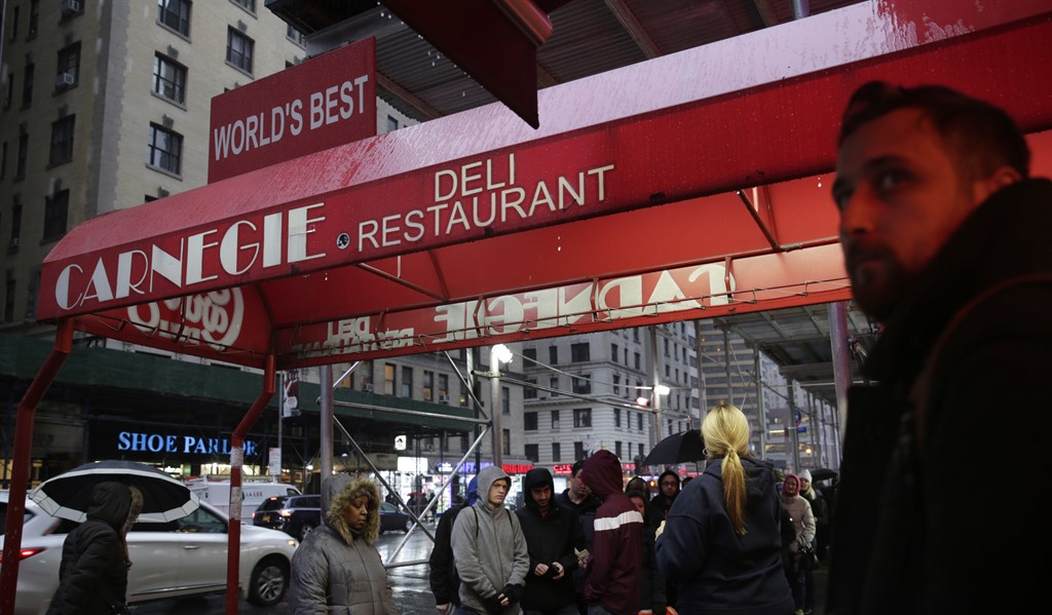He’s gotten killed for this all day online but I’m convinced the reaction is mostly opportunistic. The left hates him because he’s a center-right elitist; the right hates him because … he’s a center-right elitist. So when he farts out a passage this comically awkward, about a friendship nearly ruined by class panic over lunch meat, both sides start snickering.
The punchline, though, is that the anecdote’s in service to a point about tearing down cultural class barriers. David Brooks, “New York Times conservative” and noted admirer of creased pants, is begging his well-heeled readership to check their privilege. It may be the most populist column he’s ever written.
Recently I took a friend with only a high school degree to lunch. Insensitively, I led her into a gourmet sandwich shop. Suddenly I saw her face freeze up as she was confronted with sandwiches named “Padrino” and “Pomodoro” and ingredients like soppressata, capicollo and a striata baguette. I quickly asked her if she wanted to go somewhere else and she anxiously nodded yes and we ate Mexican.
American upper-middle-class culture (where the opportunities are) is now laced with cultural signifiers that are completely illegible unless you happen to have grown up in this class. They play on the normal human fear of humiliation and exclusion. Their chief message is, “You are not welcome here.”…
Status rules are partly about collusion, about attracting educated people to your circle, tightening the bonds between you and erecting shields against everybody else. We in the educated class have created barriers to mobility that are more devastating for being invisible. The rest of America can’t name them, can’t understand them. They just know they’re there.
That’s as close as Brooks will ever get to a blue-collar sneer at “latte-sippers,” so enjoy it. One of the better parodies among the many online today:
great stuff in the latest David Brooks column pic.twitter.com/6PFYAaKaCT
— Jason O. Gilbert (@gilbertjasono) July 11, 2017
Some critics complained that Brooks equates Mexican food with more downscale eats, although (a) Mexican food is more affordable on average than many other types of cuisine and (b) I assume “Mexican” to the average American is a byword for tacos, burritos, and other inexpensive quickly prepared fare, notwithstanding the existence of upscale Mexican restaurants. He and his friend seem to have chosen Mexican not just because it’s cheap but because it’s familiar, a point of cultural overlap between better educated and less well educated. Everyone enjoys a good burrito, just like everyone enjoys a good burger or good pizza. No need to read anything into it about Mexican food becoming the official cuisine of the Great Unwashed in Brooks’s mind.
The other complaint is that he jumps to conclusions in inferring that his friend is uncomfortable with gourmet food partly because she lacks a college degree. Without confirming that she really was anxious, he’s indulging in a stereotype. That’s fair enough: A member of my family who has a high-school degree but no college is more of a gourmand than I am. Other family members with less education, though, do tend to react to unfamiliar food the way Brooks’s friend supposedly did, although I wouldn’t call it “anxiety” so much as “suspicion.” Once I talked them into trying an Ethiopian place I liked and they scoffed through the whole dinner at the idea that anyone could enjoy it, never mind that the main ingredients were as common as could be — beef, chicken, potatoes. It wasn’t that they were nervous ordering dishes they’d never heard of, it was more that they found it pretentious that anyone with a choice would choose something as conspicuously exotic as Ethiopian. Who the hell would spend a hundred bucks on that when you could go for Italian and know you’ll be getting something you like?
I’ve been on the other side of it too, though. Haven’t we all? I’ll try any type of ethnic food, however arcane, but I do feel some class anxiety at restaurants that offer a cheese course. It’s just a touch too well-bred for total comfort. Same with wine. Food and drink that are renowned for attracting gourmet sensibilities are always daunting for someone who’s ignorant of the differences between them. It doesn’t feel like a stretch that someone might have the same reaction in a gourmet sandwich shop. Although Josh Barro makes a good point in noting that “elite cuisine” isn’t as sharply defined as it used to be. In a country with a Starbucks (or two Starbucks) on every corner, aren’t we all latte-sippers now?
Anyway, Brooks should have made his friend stand there in a cold sweat in the sandwich shop ordering something esoteric instead of politely suggesting tacos instead. That would have been the thoughtful thing to do, no? The Internet would have loved that.








Join the conversation as a VIP Member